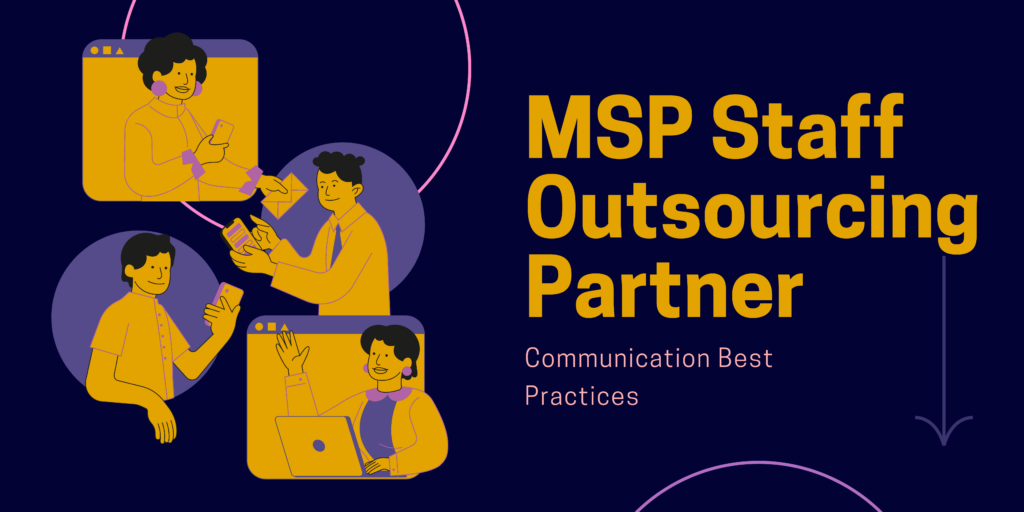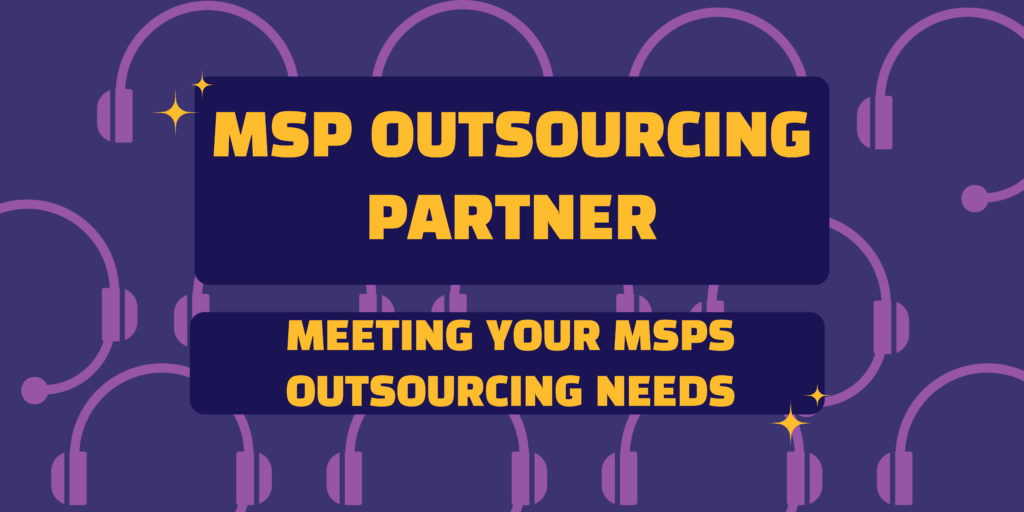Selecting the right outsourcing partner is crucial for MSP success. MSP owners need to understand their outsourcing needs to evaluate potential partners and manage relationships effectively. What are those essential criteria?
Technical expertise, cultural fit, and compliance come to the forefront while exploring strategies to mitigate risks and ensure seamless operations are the nuances that make an excellent fit.

Selecting the Right MSP Outsourcing Partner
- Brief overview of the importance of outsourcing for MSPs in enhancing operational efficiency and reducing costs.
- Highlight the criticality of choosing the right outsourcing partner to align with business goals and maintain service quality.
Outsourcing has become a cornerstone strategy for Managed Service Providers (MSPs) looking to enhance operational efficiency and reduce costs. By engaging with a specialized MSP outsourcing vendor, MSPs can access external expertise and resources, enabling them to deliver high-quality services without the burden of managing all operations in-house.
Selecting the right MSP outsourcing partner is critical for aligning with business goals and maintaining high service quality. A well-chosen partner complements an MSP’s strengths and addresses its weaknesses, ensuring seamless service delivery and allowing the MSP to focus on core business activities.
Understanding Your MSP’s Outsourcing Needs
- Identify core requirements. Define what functions are essential to outsource (e.g., helpdesk support, network management) and why.
- Assess your current capabilities. Analyze the gaps in your current setup that outsourcing can fill.
- Set clear objectives. Outline the expected outcomes from outsourcing such as cost reduction, improved service quality, or expanded service offerings.
Identify Core Requirements
To begin, it’s essential to define the functions that are crucial for outsourcing. Key areas might include helpdesk support, network management, and cybersecurity services. Outsourcing these functions to a reputable MSP outsourcing vendor can streamline operations and allow MSPs to focus on core competencies.
Assess Your Current Capabilities
Next, evaluate your current setup to identify gaps that outsourcing can address. For instance, if your in-house team struggles with round-the-clock help desk support, an MSP remote help desk staff can fill this gap effectively. A detailed assessment will highlight areas where outsourced MSP staff can enhance your service delivery. The article from Tracker emphasizes the importance of this self-evaluation to align outsourcing with your strategic goals.
Set Clear Objectives
Clearly defining the objectives of outsourcing is critical. Whether the goal is cost reduction, improved service quality, or expanded service offerings, having specific targets helps in measuring the success of your outsourcing partnership. For instance, setting an objective to reduce response times for helpdesk queries by 30% within six months can guide the selection and evaluation of your MSP outsourcing vendor.
Setting measurable goals ensures that both parties are aligned and focused on achieving desired outcomes.
Types of Outsourcing – MSP Staff Outsourcing Types
MSP staff outsourcing can be categorized into several types, each tailored to meet specific business needs.
Onshore outsourcing involves partnering with vendors within the same country, offering benefits like cultural alignment and ease of communication.
Nearshore outsourcing refers to collaborating with vendors in neighboring countries, balancing cost savings with geographical proximity.
Offshore outsourcing involves engaging vendors in distant countries, often providing significant cost reductions due to lower labor costs.
Direct outsourcing focuses on hiring external staff to handle specific tasks or projects directly under the management of the outsourcing partner. Dedicated outsourced staff provides a team of professionals who work exclusively for the MSP, ensuring consistent service and alignment with the MSP’s goals. Augmented staff outsourcing supplements the MSP’s existing team with external experts, providing additional skills and resources as needed without fully outsourcing any functions.
Criteria for Selecting an MSP Outsourcing Partner
- Technical expertise and certifications. Importance of relevant industry certifications and proven technical expertise.
- Experience in your industry. The value of choosing a partner with a track record in similar environments or industries.
- Cultural fit. Why it’s crucial that the outsourcing partner understands and aligns with your organizational culture and values.
- Communication standards. Ensuring seamless communication protocols to avoid misunderstandings and ensure smooth operations.

Technical Expertise and Certifications
When selecting an MSP outsourcing vendor, it’s crucial to assess their technical expertise and certifications. Relevant industry certifications, such as ITIL, CompTIA, or ISO, are indicators of a vendor’s proficiency and adherence to best practices. Proven technical expertise ensures that the partner can handle the specific technological needs of your MSP. According to TTMC, verifying technical credentials is a foundational step in selecting the right outsourcing partner.
Experience in Your Industry
Experience within your specific industry is another vital criterion. An MSP outsourcing partner with a proven track record in similar environments can provide insights and solutions tailored to industry-specific challenges. Their familiarity with common issues and regulatory requirements in your sector can significantly enhance service quality. The value of industry-specific experience is emphasizing the benefits of selecting a partner well-versed in your operational context.
Cultural Fit with the Right MSP Outsourcing Partner’s Staff
Cultural fit is often overlooked but is crucial for a successful outsourcing partnership. Your MSP outsourcing vendor should understand and align with your organizational culture and values to ensure a harmonious working relationship. A mismatch in corporate culture can lead to misunderstandings and conflicts. Effective cultural alignment fosters better communication, collaboration, and overall satisfaction. Cultural compatibility can significantly impact the success of the outsourcing arrangement.
Communication Standards
Ensuring seamless communication protocols is essential to avoid misunderstandings and ensure smooth operations. An effective MSP outsourcing partner will have established communication standards and tools that facilitate clear and consistent interactions. Regular updates, transparent reporting, and responsive communication channels are key elements. Best Practice Group emphasizes the importance of robust communication frameworks in maintaining a productive outsourcing partnership.
Evaluating Potential MSP Outsourcing Partners
- Request for proposal (RFP) process. Designing an RFP that encompasses all your needs and evaluating responses effectively.
- References and case studies. How to analyze past performance through references and case studies to gauge reliability and effectiveness.
- Trials and proof of concept. Implementing trial periods or proof of concept projects to evaluate real-world effectiveness.
Request for Proposal (RFP) Process
Designing a comprehensive Request for Proposal (RFP) is a critical step in evaluating potential MSP outsourcing partners. The RFP should encompass all your needs, including technical requirements, service levels, and cultural fit. By clearly outlining your expectations, you can better compare responses and select a vendor that aligns with your objectives. Business.com provides detailed guidance on crafting effective RFPs to streamline the selection process.
References and Case Studies
Analyzing past performance through references and case studies is essential for gauging a vendor’s reliability and effectiveness. Request detailed case studies and speak with references to understand how the MSP outsourcing partner has managed similar projects. This due diligence can reveal insights into their problem-solving abilities, responsiveness, and overall performance.
Trials and Proof of Concept
Implementing trial periods or proof of concept projects allows you to evaluate the real-world effectiveness of a potential MSP outsourcing partner. These trials provide a hands-on opportunity to assess their capabilities, communication, and fit with your organization. It’s a practical way to mitigate risks and ensure the partner meets your expectations before committing to a long-term contract.
Legal and Compliance Considerations
- Contracts and agreements. Key components of contracts such as scope, service level agreements (SLAs), confidentiality clauses, and exit strategies.
- Data security and privacy laws. Ensuring the partner complies with relevant data protection regulations (e.g., GDPR, HIPAA).

Contracts and Agreements
When entering into an outsourcing partnership, it’s crucial to have well-defined contracts and agreements. These documents should detail the scope of services, clearly outlining what tasks the MSP outsourcing vendor will handle. Service Level Agreements (SLAs) must specify the expected performance standards and the penalties for failing to meet these standards. Additionally, confidentiality clauses are vital to protect sensitive business information. Exit strategies should also be included to ensure a smooth transition if the partnership ends. According to Best Practice Group, thorough contracts are essential for mitigating risks and ensuring both parties understand their responsibilities.
Data Security and Privacy Laws
Compliance with data security and privacy laws is non-negotiable when outsourcing. Your MSP outsourcing partner must adhere to relevant regulations such as the General Data Protection Regulation (GDPR) or the Health Insurance Portability and Accountability Act (HIPAA). Ensuring the vendor has robust data protection measures in place is crucial for safeguarding sensitive information and maintaining customer trust. The article from MindK emphasizes the importance of verifying the partner’s compliance with data protection laws to avoid legal repercussions and data breaches.
Managing the Outsourcing Relationship
- Communication Framework: Setting up regular check-ins and updates to keep both parties aligned.
- Performance Monitoring and Feedback: Tools and metrics to continuously monitor performance and provide constructive feedback.
- Scalability and Flexibility: Ensuring the partnership can adapt to changing business needs and growth.
Communication Framework with the Right MSP Outsourcing Partner
Setting up a robust communication framework is key to managing an outsourcing relationship effectively. Regular check-ins and updates help keep both parties aligned and ensure that any issues are addressed promptly. Weekly or bi-weekly meetings, combined with detailed reports, can facilitate transparent and effective communication.
Performance Monitoring and Feedback
Continuous performance monitoring and feedback are crucial for maintaining high service standards. Utilizing tools and metrics to track the performance of your MSP outsourcing partner allows you to identify areas for improvement and ensure compliance with SLAs. Regular performance reviews and constructive feedback sessions can help in fine-tuning the services and addressing any concerns.
Scalability and Flexibility
Ensuring that your outsourcing partnership can adapt to changing business needs and growth is essential for long-term success. The MSP outsourcing vendor should offer scalability and flexibility to accommodate your evolving requirements. This includes the ability to scale services up or down based on demand and to integrate new technologies or processes as needed. The article from Invensis suggests that having a flexible outsourcing arrangement can significantly enhance your ability to respond to market changes and business expansion.
Mitigating Risks in MSP Staff Outsourcing
- Risk Identification and Mitigation Strategies: Identifying potential risks associated with outsourcing and strategies to mitigate them.
- Contingency Planning: Preparing for potential issues with backup plans and safety measures.
Risk Identification and Mitigation Strategies
Identifying potential risks associated with outsourcing is the first step in developing effective mitigation strategies. Common risks include data breaches, service disruptions, and non-compliance with regulations. To mitigate these risks, MSPs should conduct thorough due diligence on potential outsourcing vendors, ensuring they have robust security measures and a proven track record. Regular audits and compliance checks are also essential. According to PKF Mueller, proactively identifying and addressing risks can significantly enhance the success of outsourcing partnerships.
Contingency Planning
Preparing for potential issues with backup plans and safety measures is crucial for managing outsourcing risks. This includes having a clear contingency plan for service disruptions, such as backup vendors or internal resources that can take over critical tasks temporarily. Additionally, maintaining a disaster recovery plan ensures that your MSP can quickly recover from unforeseen events. Invensis emphasizes the importance of contingency planning in minimizing the impact of potential risks and ensuring business continuity.
Which Is the Best Example of MSP Staff Outsourcing?
A prime example of successful outsourcing in the MSP industry is when an MSP partners with a dedicated staff outsourcing provider to enhance their service delivery.

By outsourcing helpdesk support to a specialized vendor, MSPs can significantly reduce response times and improve customer satisfaction. For instance, an MSP that sets a goal to reduce helpdesk query response times by 30% within six months can leverage the expertise of a dedicated outsourcing partner.
This partner provides trained professionals who handle support queries efficiently, allowing the MSP to focus on strategic growth, in Support Adventure’s case, with up to 60% less cost compared to in-house hiring!
Final Words on Selecting the Right MSP Outsourcing Partner
Selecting the right MSP outsourcing partner is a critical decision that can significantly impact your business’s success. By understanding your outsourcing needs, evaluating potential partners, and managing the relationship effectively, MSPs can leverage outsourcing to enhance operational efficiency and service quality. Ensuring legal and compliance considerations are met and implementing risk mitigation strategies further strengthens the partnership. With careful planning and ongoing management, outsourcing can be a powerful tool for growth and innovation in the MSP industry.



0 Comments